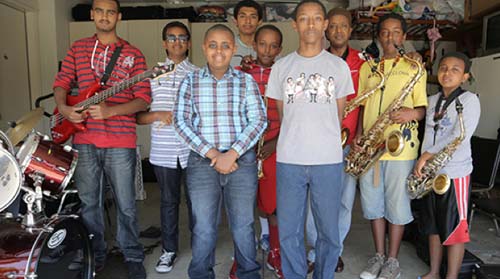
(Oakland, CA) It’s a truth universally acknowledged that kids hate their parents’ music, or at least do their best to ignore it. Garage bands don’t borrow CDs from their parents so they can practice disco covers.
Okay, maybe, but only in some kind of ironic hipster way.
Well there’s nothing ironic about the music being played in this suburban garage near Oakland, California. The Young Ethio Jazz Band are teenagers who rock out with their parents’ music.
The band played its first gig in San Francisco last winter. Now it is slated to open for another act at Yoshi’s, a famous jazz club in San Francisco, and then it plays in the Ethiopian Heritage Festival at Georgetown University in Washington, DC.
All of the kids are second generation Ethiopians between 11 and 16-years-old. Before they started playing together a year and a half ago, most of them had the stereotypical reaction to their parents’ music.
“In the very beginning I was really confused about the music,” says Yohanas Abanew, who plays keyboard in the band. “I just said ‘well this doesn’t really sound like music that I would really want to play.’”
Then he started practicing an Ethio-jazz song in his high school band. “It really woke me up,” he says, “this is my culture, and I really need to learn this music.”
Yonathan Wolday had a similar revelation. He’s a tall, lanky 16-year-old who plays trumpet. Wolday is wearing a gray sweatshirt with a picture of a diamond and the letters “DMND.” A pair of white ear phones hang out from his collar and onto his chest.
His parents are from Ethiopia, and the songs they listen to are in Amharic, the official language in Ethiopia. Wolday doesn’t understand it well, and that initially turned him off from the music. He didn’t really start listening to the songs until he began playing in the band.
Even now, it’s hard to believe that he’s channeling the music of his parents’ generation. Whenever the band stops practicing, you can hear simple rap bass lines pulsating out from his dangling ear buds.
Vibraphonist Mulatu Astatke gave birth to Ethio-jazz in the early 70s. He was the first African student to attend the Berklee College of Music in Boston. There he fused Western jazz with Latin rhythms and traditional Ethiopian scales.
To read article in it’s entirety visit source: “PRI’s The World.”
